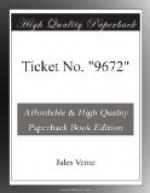This being the case, no one will be surprised at the effect produced upon both continents—an effect easily explained when we remember how prone we all are to superstition. A lottery ticket so providentially rescued from the waves could hardly fail to be the winning ticket. Was it not miraculously designated as the winner of the capital prize? Was it not worth a fortune—the fortune upon which Ole Kamp had counted?
Consequently it is not surprising that overtures for the purchase of this ticket came from all parts of the country. At first, the prices offered were small, but they increased from day to day; and it was evident that they would continue to increase in proportion as the day of the drawing approached.
These offers came not only from different parts of Scandinavia, which is a firm believer in the active intervention of supernatural powers in all mundane matters—but also from foreign lands, and even from France.
Even the phlegmatic English grew excited over the matter, and subsequently the Americans, who are not prone to spend their money so unpractically. A host of letters came to Dal, and the newspapers did not fail to make mention of the large sums offered to the Hansen family. A sort of minor stock exchange seemed to have been established, in which values were constantly changing, but always for the better.
Several hundred marks were, in fact, offered for this ticket, which had only one chance in a million of winning the capital prize. This was absurd, unquestionably, but superstitious people do not stop to reason; and as their imaginations became more and more excited, they were likely to bid much higher.
This proved to be the case. One week after the event the papers announced that the amounts offered for the ticket exceeded one thousand, fifteen hundred and even two thousand marks. A resident of Manchester, England, had even offered one hundred pounds sterling, or two thousand five hundred marks; while an American, and a Bostonian at that, announced his willingness to give one thousand dollars for ticket No. 9672 of the Christiania Schools Lottery.
It is needless to say that Hulda troubled herself very little about the matter that was exciting the public to such an extent. She would not even read the letters that were addressed to her on the subject; but the professor insisted that she must not be left in ignorance of these offers, as Ole Kamp had bequeathed his right and title in this ticket to her.
Hulda refused all these offers. This ticket was the last letter of her betrothed.
No one need suppose that this refusal was due to an expectation that the ticket would win one of the prizes in the lottery. No. She saw in it only the last farewell of her shipwrecked lover—a memento she wished to reverently preserve. She cared nothing for a fortune that Ole could not share with her. What could be more touching than this worship of a souvenir?




